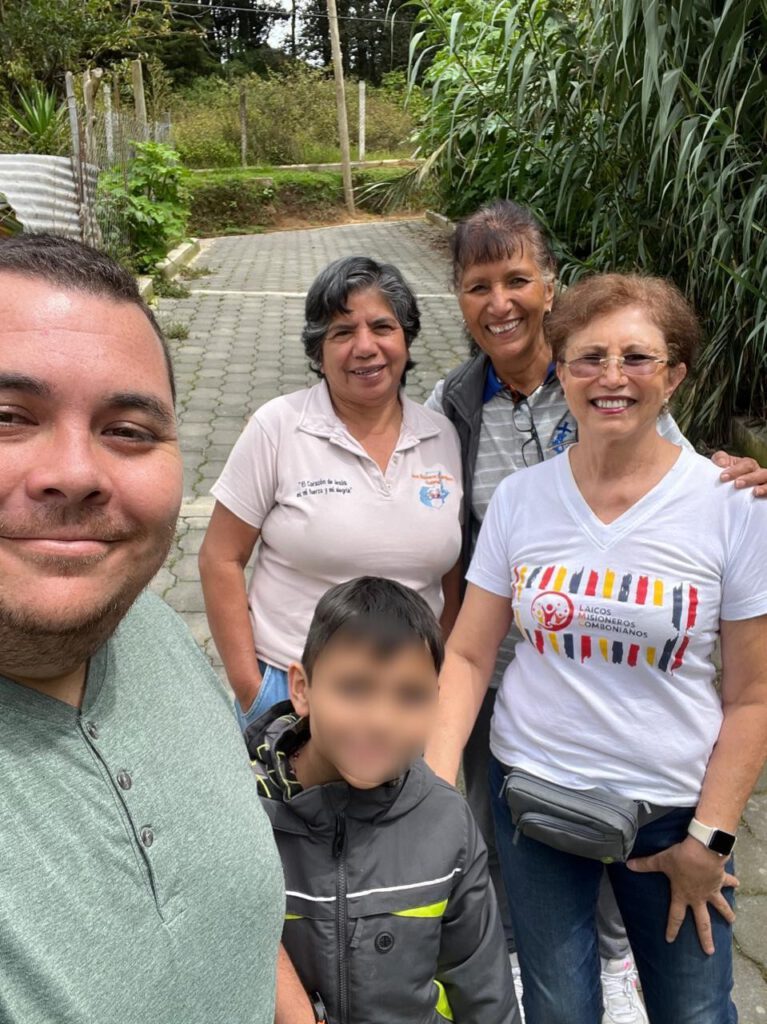“Neither the one who plants nor the one who waters is anything, but only God, who makes things grow” (1 Corinthians 3:7)
On July 5, we had the opportunity to carry out a missionary day in the community of León El Manzanillo, an enriching experience for both us and the local residents. During the morning, we visited community members in their homes, approaching them with the purpose of informing them about the initiatives we had planned for that day. We also took advantage of each conversation to introduce ourselves as a missionary group and extend a special invitation to participate in the monthly celebration of the Eucharist, which takes place on the second Sunday of each month.
In the afternoon, we shared with those in attendance a brief reflection on the Sacred Heart of Jesus, seeking to spread his message of love and mercy. The day ended with a practical workshop focused on caring for the environment, during which we taught how to make baskets using recycled newspaper, thus fostering creativity and ecological awareness.

As we mentioned, one of the objectives of the missionary work in Manzanillo is for the inhabitants to participate in the Eucharist. After sowing the seed and continuing to water it, it is God who will take care of its growth in their hearts. On Sunday the 13th, some of our members accompanied the community in the Eucharist and noticed that more people attended, which gives us great joy because the Eucharist is the center of our faith.
Gathering on July 20
On Sunday, July 20, in addition to sharing as a community and reviewing our missionary work, we received the following formation topics:
- The first proclamation and the missionary role
As missionaries, we must remember that our work does not focus on worrying about results, for triumphs or failures are not evaluated according to human parameters. The essential thing is that when we sow the seed of God’s love, we trust that it will be the Lord who will take care of the harvest. Within the content of the proclamation of the Kerygma, we reflected on the main idea: God is a loving Father who loves us personally and unconditionally. His love does not depend on our being good, but on His being good. However, we may not experience this divine love because of sin, from which we cannot free ourselves by our own strength. Likewise, we cannot defeat our main enemies on our own: the world, the flesh, and Satan. Therefore, we need salvation.

But THE GOOD NEWS is that Jesus has already saved and forgiven us by paying our debt with the sacrifice of his blood. By dying and rising again for us, he has given us new life as children of God, a gift we can receive by believing in him, trusting in his love, and continually converting ourselves. A true encounter with Christ leads us to become part of his body and brings us closer to our brothers and sisters, especially those most in need, in order to build the Kingdom of God.
This central message must be adapted to the particularities of each person, considering the different levels of spiritual development in which they may find themselves. Therefore, when proclaiming the GOOD NEWS, we must first analyze individual needs and develop an appropriate plan that responds to them.
- Consciousness
Human beings are made up of three fundamental areas which, although closely interconnected, are analyzed separately in order to better understand and address them. These areas are: the mind, the body, and the spirit.
Consciousness is an inner force that allows us to discern and make sense of every situation in our lives. It plays a crucial role in the search for purpose, helping us to identify meaningful values, goals, and objectives.
To illustrate the concept of consciousness, the parable of the compass was presented as a metaphor:
- Direction: symbolizes the most relevant goal in a person’s life.
- The body of the compass: represents the individual’s mindset.
- Needle: reflects a specific responsibility necessary to achieve the goal.
It is important to foster both social awareness and personal awareness. Social awareness involves having empathy for the perspectives and emotions of those around us, respecting collective norms, and behaving responsibly within the community. On the other hand, personal awareness is oriented toward introspection, managing our emotions, understanding our feelings, thoughts, and the way we interact with others.

By cultivating our awareness as part of our integral development, we take a firm step toward authentic freedom.
CLM Guatemala





